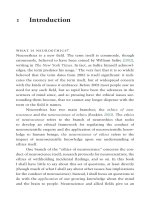- Trang chủ >>
- Khoa Học Tự Nhiên >>
- Vật lý
sex appeal six ethical principles for the 21st century feb 2010
Bạn đang xem bản rút gọn của tài liệu. Xem và tải ngay bản đầy đủ của tài liệu tại đây (395.89 KB, 157 trang )
sex
APPEAL
Other books by Paul R. Abramson
Personality: A Heuristic Perspective
Sarah: A Sexual Biography
Bias in Psychotherapy (edited with Joan Murray)
A Case for Case Studies
With Pleasure: Thoughts on the Nature of Human Sexuality
(with Steve Pinkerton)
Sexual Nature/Sexual Culture (edited with Steve Pinkerton)
A House Divided: Suspicions of Mother-Daughter Incest (with
Steve Pinkerton)
Sexual Rights in America: The Ninth Amendment and the
Pursuit of Happiness (with Steve Pinkerton and Mark
Huppin)
Romance in the Ivory Tower: The Rights and Liberty of
Conscience
sex
APPEAL
SIX ETHICAL PRINCIPLES FOR THE 21
ST
CENTURY
PAUL R. ABRAMSON
1
2010
1
Oxford University Press, Inc., publishes works that further
Oxford University’s objective of excellence
in research, scholarship, and education.
Oxford New York
Auckland Cape Town Dar es Salaam Hong Kong Karachi
Kuala Lumpur Madrid Melbourne Mexico City Nairobi
New Delhi Shanghai Taipei Toronto
With offices in
Argentina Austria Brazil Chile Czech Republic France Greece
Guatemala Hungary Italy Japan Poland Portugal Singapore
South Korea Switzerland Thailand Turkey Ukraine Vietnam
Copyright Ó 2010 by Paul R. Abramson
Published by Oxford University Press, Inc.
198 Madison Avenue, New York, New York 10016
www.oup.com
Oxford is a registered trademark of Oxford University Press
All rights reserved. No part of this publication may be reproduced,
stored in a retrieval system, or transmitted, in any form or by any means,
electronic, mechanical, photocopying, recording, or otherwise,
without the prior permission of Oxford University Press.
Library of Congress Cataloging-in-Publication Data
Abramson, Paul R., 1949–
Sex appeal : six ethical principles for the 21st century / Paul R. Abramson.
p. cm.
Includes bibliographical references and index.
ISBN 978-0-19-539389-7
1. Sexual ethics. I. Title.
HQ32.A27 2010
176—dc22
2009017020
135798642
Printed in the United States of America
on acid-free paper
I want to touch you with my heart;
I want to feel you with my words;
I want to watch you hear me think;
In your love I want to drink.
—Crying 4 Kafka
This page intentionally left blank
Contents
Acknowledgments ix
Introduction xi
1. Do No Harm 3
2. Celebrate Sex 23
3. Be Careful 39
4. Know Yourself 61
5. Speak Up / Speak Out 81
6. Throw No Stones 103
Conclusion 117
References 121
Index 129
vii
This page intentionally left blank
Acknowledgments
Revise, revise, and revise again is the mantra for writing. First
time success is rare. Computers help enormously with this
task, but the real impetus for revision is feedback from
friends, colleagues, and students. I would like to thank
them now. Andy Christensen, Ralph Bolton, Felicia de la
Garza Mercer, Mick Gusinde-Duffy, and Simon LeVay all
provided valuable input, as did my students from UCLA and
the students of my invited lectures at Pomona College. Most
important of all, however, was the support and feedback
I received from Sarah Harrington, my editor at Oxford
University Press. She was the icing on the cake.
ix
This page intentionally left blank
Introduction
Over the years I have come to realize that, in this country, we
have a great need for sound advice about sex—something
beyond the chatter of disc jockey pundits and the promises
of the omnipresent ‘‘how to’’ manuals. As it turns out, sex
has many complications. It is explosively euphoric, but can
also be the source of potentially fatal infections. Exquisitely
intimate, sex can be the vehicle for coercion. Though it is a
natural biological function essential to the survival of the
human race, religion and the law also heavily regulate sex.
And while we have the capacity for intense sexual pleasure,
the options and prohibitions that confront us are often
overwhelmingly daunting. Good advice, or more impor-
tantly, good sexual principles and habits, are worthy of
attention.
I want to start this discussion with a disclaimer. This is not
a book about dating strategies, pick-up lines, or orgasmic
techniques. That market is saturated. Instead, this book will
xi
address the much thornier ethical, psychological, and social
factors involved in sexual experience, such as the personal
and cultural constraints to sexual pleasure, the rationale
underlying sexual diversity, the vehicles for sexual commu-
nication, the nuances of sexual harm, and so on.
To simplify what can be confusing and complex subject
matter, I have organized the major themes of this book into
six key concepts—one per chapter. Memorize them now: Do
No Harm, Celebrate Sex, Be Careful, Know Yourself, Speak
Up/Speak Out, and Throw No Stones. Imagine them on a
Post-it or on the back of a t-shirt. Even better, write them
down, repeatedly if necessary.
Why? These six principles form the essence of my advice
about sex. It is my belief that many, if not all, of the rewards
of sex can be enhanced and its difficulties alleviated by
adherence to these six easy-to-understand ideas. Think of
them as the prerequisites for ‘‘good’’ sex in the twenty-first
century.
Here is how this works. Where sex is concerned, the first
order of business is to Do No Harm. Imagine what a better
world this would be if everyone stopped hurting each other
sexually. Even a collective attempt to discontinue sexual harm
would bring about a monumental change in public health and
well-being. Once we have vowed to do no harm, we can then
Celebrate Sex without fear of violence or mistreatment. Sex
feels so extraordinarily good for a reason. But in order to
maximize this effect we obviously need to Be Careful in our
selection of sexual partner(s), and of the risks of unwanted
Introduction
xii
pregnancy and sexually transmitted infections. Similarly,
I believe it is important to Know Yourself in order to be
careful; if we know ourselves well, we can make healthier and
more fulfilling choices. To help achieve that aim, we should
Speak Up/Speak Out about sex, using meaningful dialogue
with friends, loved ones, and with our partner(s)—as well as
by engaging in public debate about sex. Finally, Throw No
Stones: let us stop being judgmental about other adults’ con-
sensual sexual practices when they are void of tangible harm.
That, in a nutshell, is the summation of my advice. This
book represents my appeal to readers to practice a set of
ethical principles that will lead to a healthier, happier, and
more fulfilling sex life. Thrown in for good measure as well is
the fact that being ethically smart is very sexy too; hence, the
aura of sex appeal.
Where did I come up with this list? Many sources and
experiences were instrumental, but one contribution, in
particular, is worth mentioning at the start. In the summer
of 2001, U.S. Surgeon General David Satcher, MD, published
‘‘The Surgeon General’s Call to Action to Promote Sexual
Health and Responsible Sexual Behavior.’’ Satcher was
gravely concerned. The nation, he believed, was facing a
crisis. Sexual health and responsible sexual behavior had
gone awry. Americans were suffering from astronomical
rates of sexually transmitted infections (approximately 12
million per year), and undergoing massive numbers of
induced abortions (almost one and a half million per year).
A staggering percentage of pregnancies were unintended
Introduction
xiii
(nearly one-half). Adult and child sexual assaults were
occurring with horrifying regularity (over 100,000 children
per year were being molested, while 22 percent of adult
women reported being a victim of a forced sexual act). And
so on. Dr. Satcher was determined to bring these issues to the
public’s attention so as to ‘‘begin a mature and thoughtful
discussion’’ about sex.
Satcher’s Call to Action, unfortunately, fell on deaf ears.
The truth and gravity of the aforementioned statistics and
the wisdom of his recommendations were, for all intents and
purposes, held in limbo. Satcher’s report was overly aca-
demic in its language, so it was virtually ignored by the
general public. The media paid little attention because
the report did not offer sensational, late-breaking news; by
the same token, most scholars and physicians failed to pick
up on the report’s importance because it did not reveal new
scientific data—the bread and butter of the research com-
munity. The mature and thoughtful dialogue that Satcher
envisioned never materialized.
My hope is that Sex Appeal will change that.
What makes me a fitting author for this book? There are
undoubtedly many people who have something important
to say about sex—doctors, therapists, newspaper columnists,
and so forth. They come from all walks of life and are
certainly worth listening to. Nevertheless, I am particularly
well suited for the job at hand. I have been a professor of
psychology at UCLA since 1976, and over the years I have
taught courses on human sexuality and on sexuality and the
Introduction
xiv
law to more than 20,000 students. I have written over one
hundred scientific articles and numerous popular books
about sex as well. I am often an expert witness in sex-related
litigation; for over three decades, sex-related murder and
mayhem (like rape, incest, sexual assault, sexual harassment,
obscenity, and child pornography) have been my bailiwick.
I have also served as a technical advisor to the World Health
Organization’s Global Program on AIDS, and I am a former
editor of The Journal of Sex Research.
Perhaps as a result of all of this experience, I have been
grappling for many years with a query I routinely encounter
from students and other acquaintances: ‘‘What do you
recommend about sexual ethics?’’ It is not so much that my
UCLA students perceive me as the arbiter of all things sexual,
but instead that my classes challenge the notion we some-
times entertain in our society that a kind of sexual utopia
exists whereby all sexual outcomes are joyous and ever-
lasting. Two recent lectures are a case in point, the
‘‘History of Syphilis’’ and the ‘‘The HIV Prevention
Vaccine.’’ The message of the former is that despite a cure,
syphilis rages on, while for the latter, that if you expect HIV
immunity from a vaccine, don’t hold your breath.
‘‘Well, then,’’ students often ask, ‘‘What do you recom-
mend about sex?’’ Over time, I began to reply with the
mantra that forms the backbone of this book: ‘‘Do no
harm, celebrate sex, be careful, know yourself, speak up
and speak out, and throw no stones.’’ What follows is a
detailed explanation of each recommendation, in order.
Introduction
xv
One final thought. Responsible sex is undeniably impor-
tant. But here is the difficult part. It needs to be fun as well.
Omit the fun and responsible sex is a rhetorical device void
of tangible benefits. Having previously coauthored a book
titled With Pleasure: Thoughts on the Nature of Human
Sexuality it seems prudent for me to acknowledge, first and
foremost, that most people engage in sex because it feels real
good. Yes, of course, there are multiple reproductive, psy-
chological, and relationship benefits that can accrue from
intimate contact, but let’s be honest. For most people,
orgasmic delight is what makes sex worth repeating over
and over again. Think of all the times you’ve been willing
to forego food or sleep; fib to friends, partners, or parents
about what you are doing; accept risks; and compromise
your standards simply to experience the fire down below.
Even smart and conscientious choices made about sex are
fixed on the altar of pleasure. There is no getting around this
fundamental truth, and I must stress that the ethical con-
cepts I discuss here are by no means meant to be incongruent
with the notion that sex is supposed to be enjoyable. With
this proviso firmly in mind, I encourage the reader to ser-
iously consider the following ethical recommendations.
Introduction
xvi
sex
APPEAL
This page intentionally left blank
CHAPTER 1
Do No Harm
Why do I begin with harm? Sexual harm puts people off.
Might a more optimistic principle be a better place to start?
How about enjoyment, ecstasy even? After all, this book is
about sex, so why not start with a bang?
I certainly considered as much and quite frankly in a
perfect world would not have hesitated to begin with the
most exciting aspects of sex. But unfortunately the sexual
world is anything but perfect. The best place to ethically
improve it, I believe, is with the principle, and more
importantly the habit, to do no harm.
Take a look at the numbers. In 2004 there were 95,089
forcible rapes in the United States reported to the FBI. In
2005 the number was slightly less, 93,934. This translates, at
3
least where female victims are concerned, into approxi-
mately 32.2 forcible rapes per 100,000 women a year.
Considering that only a small percentage of rapes are actually
reported, and that males can also be victims of rape, these
numbers are extremely alarming, to say the least.
Or consider our schools. The frequency of serious violent
crime (which is a composite of rape, sexual assault, robbery,
and aggravated assault statistics) committed against 12- to
18-year-old students is staggering. In the five-year period
from 2000 to 2004, there were 639,000 incidences of serious
violent crime against students while in American schools.
This translates into a rate of approximately 5 serious violent
crimes per 1000 students. (Incidentally, outside of school it is
even worse, with over one million serious violent crimes
committed against 12- to 18-year-olds between 2000 and
2004.)
When sexual assault is committed against very young
children (under 6) in the home, the perpetrator of it is
most likely to be a family member over the age of 25. The
12- to 17-year-old victim in the home, in contrast, is more
likely to be sexually assaulted by an acquaintance over 18
years of age. The bottom line is this: kids are not truly safe
from sexual assault in either the home or at school.
Abroad, the situation is not much better—often much
worse, in fact. Consider for example the incidence of sexual
harm in strife-torn countries such as Nigeria. Amnesty
International reports that Nigerian perpetrators of rape are
rarely punished and that females have no forum for
Sex Appeal
4
redressing the crime of rape. If that were not bad enough,
Amnesty International also indicates that Nigerian police
and security forces routinely commit rape as well, often as
a strategic means of intimidating communities. This tragedy
is by no means limited to Nigeria. Many countries, like
Burundi, have a high incidence of rape, or, like South
Africa, a low conviction rate for rape (Nigeria has both).
There can be little doubt that sexual harm is an epidemic
with global implications.
Now imagine this: as a first step in training all children
about sex, parents around the globe (and societies more
generally) teach the simple rule to ‘‘do no harm.’’ Imagine
too that this instruction was extraordinarily effective. What
would this world look like? What benefits would accrue?
For the most part, we would have an adult population that
did not commit rape or date rape, did not sexually abuse,
sexually harass, sexually assault, or perpetrate any of the
other sexual harms of which people are capable. As the
song goes, ‘‘What a wonderful world it would be!’’
The absence of sexual harm is not, I believe, unlike world
peace. An all-encompassing reduction or elimination of
sexual harm would have a profound impact on the planet.
Better yet, I believe also that this scenario could be achieved
more simply than world peace. With a few exceptions, sexual
harm is an offense committed by an individual. The point of
intervention, then, is each and every individual child.
Instruction to do no harm must be repeated throughout
development, from preschool to college, so that it becomes
Do No Harm
5
an entrenched habit. Our entire social body must work
toward eliminating sexual harm by teaching that the first
lesson of sex, or the first ethical principle, so to speak, is to do
no harm.
Physicians are taught the same basic rule. Do no harm.
A patient seeks a doctor’s advice. If the doctor,asopposedto
the illness itself, does not make the patient worse, the patient
at the very least has not suffered from the visit. To say
it another way, if the doctor has no effect, this is without
question better than making the patient even sicker. The best
possible scenario is that the doctor cures the patient—and
doing no harm is a good place for the doctor to start.
Harm, of course, is a relative term. People differ in what
they perceive to be harmful. To avoid ambiguity, therefore,
such efforts must start with the commitment to eliminate
those behaviors for which there is universal condemnation
in any modern society. Rape, as noted above, is a prime
example. Rape is a despicable, violent act. It uses violence
or the threat of violence to achieve its aim. Combining all of
the harms of physical violence with the psychological impact
of theft, rape constitutes the robbery of a person’s right to
control the use of their own body, the quintessential form of
personal property. Nothing is more sacred.
For example, if your car is stolen, you have lost a very
valuable piece of personal property. Most people are deva-
stated by the theft of their car. But the theft of sexuality in the
form of a rape is indisputably more traumatic than losing a
car. Your sexuality is ultimately more intimate, more
Sex Appeal
6
vulnerable, and more essential to your sense of self. It is also
scrupulously protected and highly regulated by law and
social customs. It is, as a result, generally acknowledged
that there are few fates worse than rape.
So the big question is, how do we eliminate sexual harm?
As noted above, the recommendation offered herein is to
teach children worldwide that the first rule of sex is to ‘‘do no
harm.’’ As a first step, this means creating age-appropriate
instruction about the definitions of rape, date rape, sexual
assault, and sexual harassment, in conjunction with age-
appropriate explanations of why all cultures must uniformly
condemn sexual harm. Those who rape and sexually assault
must go to jail. Those who sexually harass in the workplace
must lose their jobs, as well as pay restitution to their victims
in civil lawsuits.
Is this a wise strategy? Perhaps exposure to this kind of
information is itself traumatic to children. Though this is
certainly a reasonable concern, it is mitigated to some
extent by television and its related media. Children who
watch television or even listen to the radio are in fact
continuously exposed to information about sexual crimes
whether they want to be or not. The highly publicized
American criminal trials of Kobe Bryant and Michael
Jackson being cases in point, the topics of rape and sexual
molestation are routinely brought into nearly every home in
the United States and many others abroad. I would argue,
therefore, that it is inherently more instructive and socially
beneficial to create age appropriate instruction about sexual
Do No Harm
7
harm than to leave this critical education to television and
other media.
Similarly, we must also identify and eradicate those cul-
tural beliefs and practices that promote sexual harms like
date rape. Though the law is very clear about the necessity of
informed consent, some believe that undue pressure (like
badgering, guilt manipulating, et cetera) is a legitimate
dating strategy. It is therefore essential that we emphasize
over and over again that ‘‘no means no.’’ Worse yet, others
believe that sex is permissible when a partner is too intoxi-
cated to give consent, or has given consent to another form
of sexual expression, such as kissing. Sex with someone who
is unconscious is no less a felony crime than forcing a person
to have sex against her will—and the trauma is often no less
adverse. Undermining the cultures and attitudes that foster
date rape behaviors is a necessary part of eliminating sexual
harm. This training must therefore start in the home, and
then be further reinforced in all of our relevant social insti-
tutions (such as schools, religious institutions, and sororities
and fraternities).
Age appropriate instruction is also needed for the issue of
sexual harassment, though this is admittedly a more compli-
cated objective, in large part because sexual harassment is so
difficult to define. Unwanted and offensive sexual advances,
language, or acts are clearly sexually harassing, but the more
subtle nuances of jokes and language are more difficult to
edify. Do we, for example, teach children never to use the
word ‘‘bitch’’ because of the gender-specific derogatory
Sex Appeal
8









